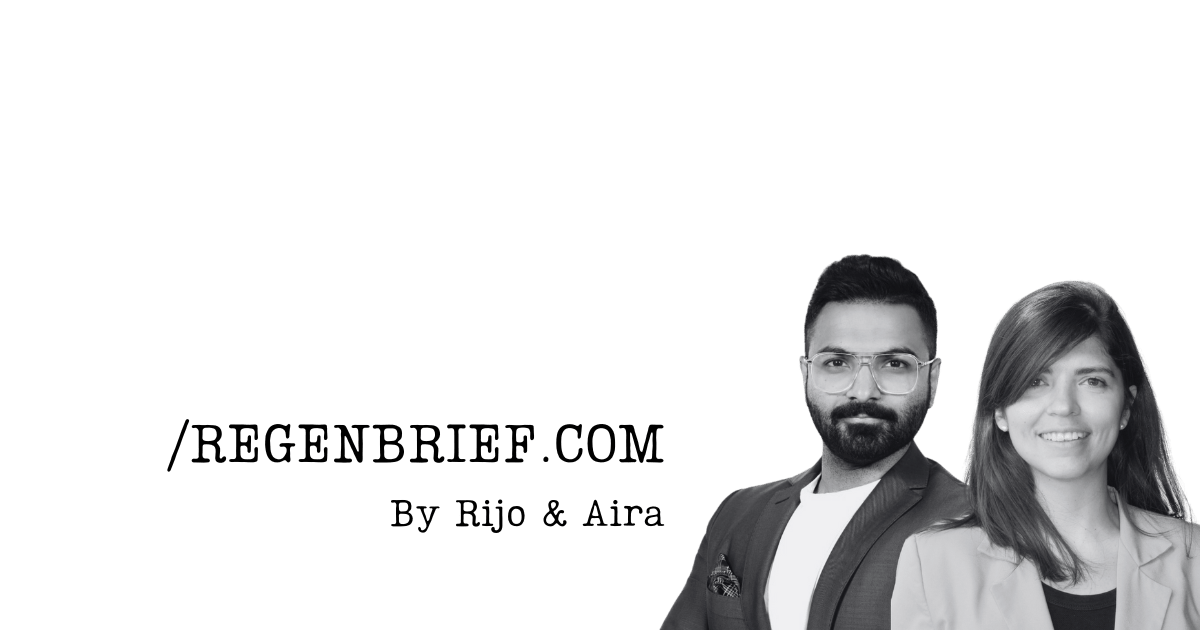Read Time: 4 minutes | Growing community exploring what 'enough' really means
💭 This Week's Question: What would your business look like if it optimized for "enough" instead of "endless growth"?
"Anyone who believes exponential growth can go on forever in a finite world is either a madman or an economist."
Dear RegenBrief reader,
Last week, we explored sustainability as a way of being rather than crisis response. This week, let's go deeper: What does regenerative economics actually look like?
Not the theoretical kind. The practical, profitable, proven kind that's already working in businesses around the world.
The fundamental shift:
From "How do we grow faster?" to "How do we thrive sustainably?"
From "What's our maximum capacity?" to "What's our optimal capacity?"
From "How do we scale?" to "How do we serve?"
The Evidence Is Already Here
Consider what we know about businesses designed for "enough":
Patagonia's "Don't Buy This Jacket" campaign increased revenue by 30% while reducing environmental impact—proving that encouraging conscious consumption can drive both purpose and profit.
Interface Inc. achieved Mission Zero (zero environmental footprint) while maintaining industry leadership and $1B+ revenue, showing that regenerative practices enhance rather than limit business success.
New Belgium Brewery sold to employees rather than maximize shareholder returns, prioritizing community ownership and long-term stewardship over short-term financial gain.
Ben Jerry's maintained a 7:1 CEO-to-worker pay ratio for decades while building a beloved global brand, demonstrating that equality can coexist with success.
The gap in our thinking:
We've been taught that "enough" means stagnation, when the data shows it often means optimization, resilience, and deeper value creation.

What If We Redefined Success?
Challenge the Growth Imperative:
What if infinite growth on a finite planet isn't just impossible—it's also unnecessary for human flourishing?
Instead of measuring quarterly growth
Measure: Employee wellbeing, community impact, ecological health, customer loyalty depth
Instead of asking "How do we get bigger?"
Ask: "How do we get better at serving life?"
Instead of optimizing for shareholders alone
Optimize for all stakeholders: people, planet, purpose, and yes—sustainable profit
The Reframe:
Growth becomes a byproduct of serving life well, not the primary objective.
Where to Start: The Sufficiency Audit

For Leaders and Organizations:
🌱 Map Your "Enough": Identify what level of success would allow your organization to thrive while contributing positively to all stakeholders. What does sustainable success look like for your specific context?
🌱 Audit Your Metrics: List your current KPIs. How many measure extraction vs. regeneration? Growth vs. health? Competition vs. collaboration? Design new metrics that reflect true wealth creation.
🌱 Practice Generous Constraints: Choose one area to intentionally limit in service of long-term sustainability. Patagonia limits production. Some companies limit CEO pay ratios. What constraint might actually free your organization?
🌱 Study Circular Models: Spend time with one business that's successfully implemented circular economy principles. How do they define success? What surprised you about their approach?
🌱 Design for Resilience: For your next strategic planning session, ask "How do we build antifragility?" instead of "How do we achieve maximum growth?" What shifts?
What's Happening Right Now
Three signals that the economy is already shifting
🟢 The B-Corp movement now includes 4,000+ certified companies across 70+ countries, proving that profit and purpose can align successfully, with B-Corps showing 28% higher growth than traditional corporations.
🟡 Doughnut Economics is being adopted by cities like Amsterdam and Copenhagen as their economic framework, prioritizing social and ecological boundaries alongside economic health.
🔴 The burnout economy continues to extract from both people and planet, with 76% of employees reporting burnout and ecological overshoot occurring earlier each year—signaling the urgent need for economic models based on sufficiency rather than extraction.
This Week's Experiment
Try "Optimization Over Maximization" for 7 days:
In every decision—personal and professional—ask:
"What's the optimal choice?" rather than "What's the maximum choice?"
"How do we do this beautifully?" rather than "How do we do this biggest?"
"What serves the whole?" rather than "What serves me most?"
Track how this changes your stress levels, decision quality, and relationships.
📚 This Week's Resource: "Doughnut Economics" by Kate Raworth—a framework for 21st century thinking that puts thriving within planetary boundaries at the center.
💭 Question for LinkedIn: "What would change if your organization optimized for 'enough' instead of 'endless growth'?"Let's Explore This Together
Let's Design This Together
Are you experimenting with sufficiency-based business models? Have you found ways to thrive without the growth imperative?
Reply to this email with your experience, or book a conversation to explore how the economics of enough might transform your leadership approach.
Coming Up
Next week: "Regenerative Leadership: What Happens When We Lead Like Nature?"
This isn't about limits.
This is about discovering what abundance actually looks like.
This is regeneration.
Stay regenerative,
— The RegenBrief Team
regenbrief.com | @regenbrief
Let Us Help You Lead the Shift
Whether you're in strategy, ESG reporting, operations or innovation—
This is your moment to shape not just a better business, but a better future.
Curious where regeneration fits into your model?
Let’s explore the possibilities together.
This is more than sustainability.
This is life-centered design.
This is regeneration.



